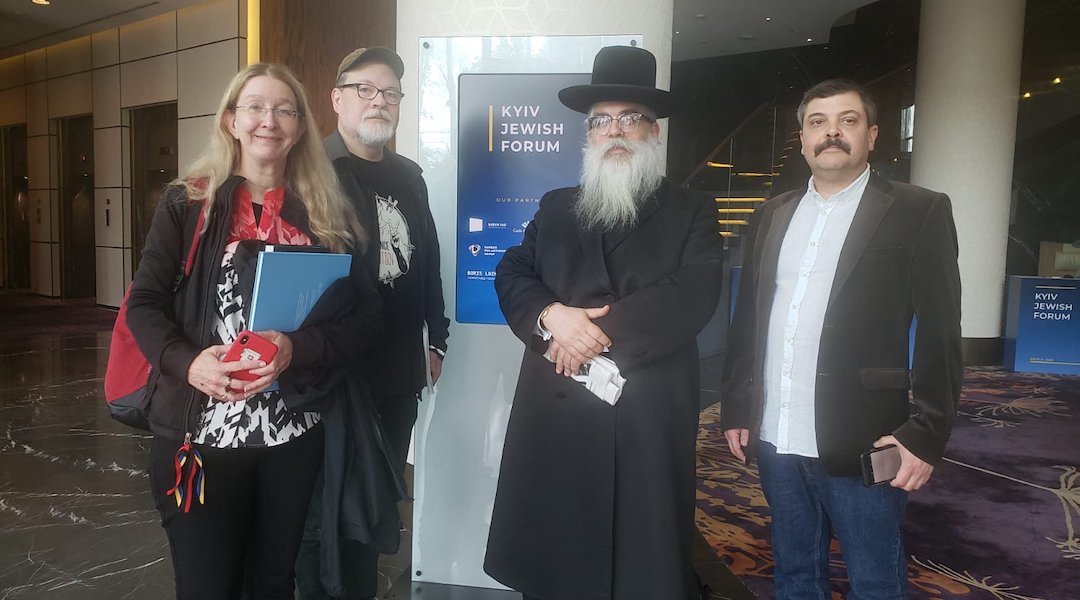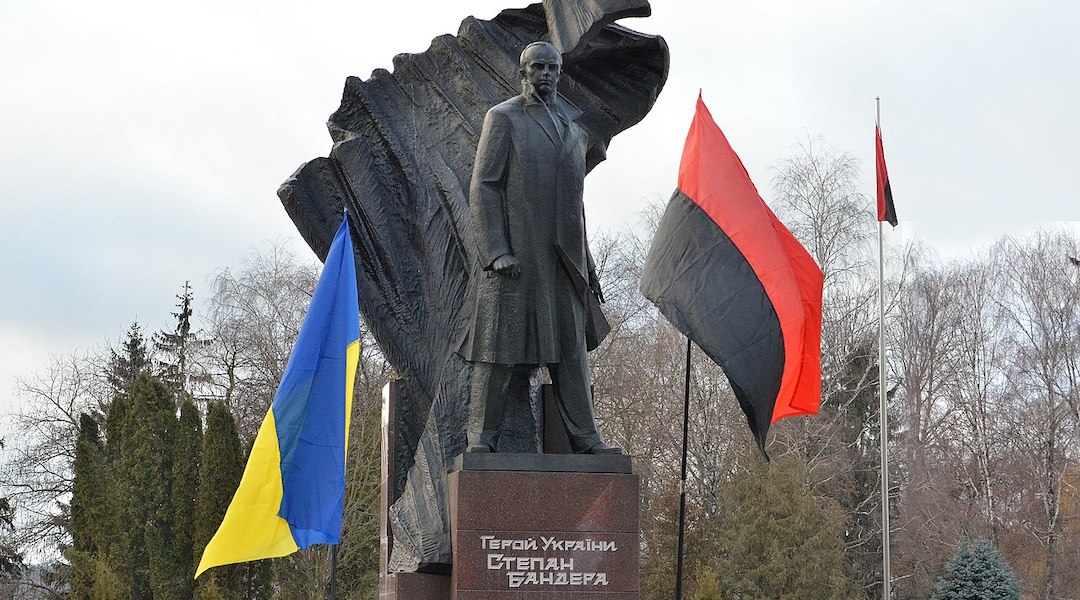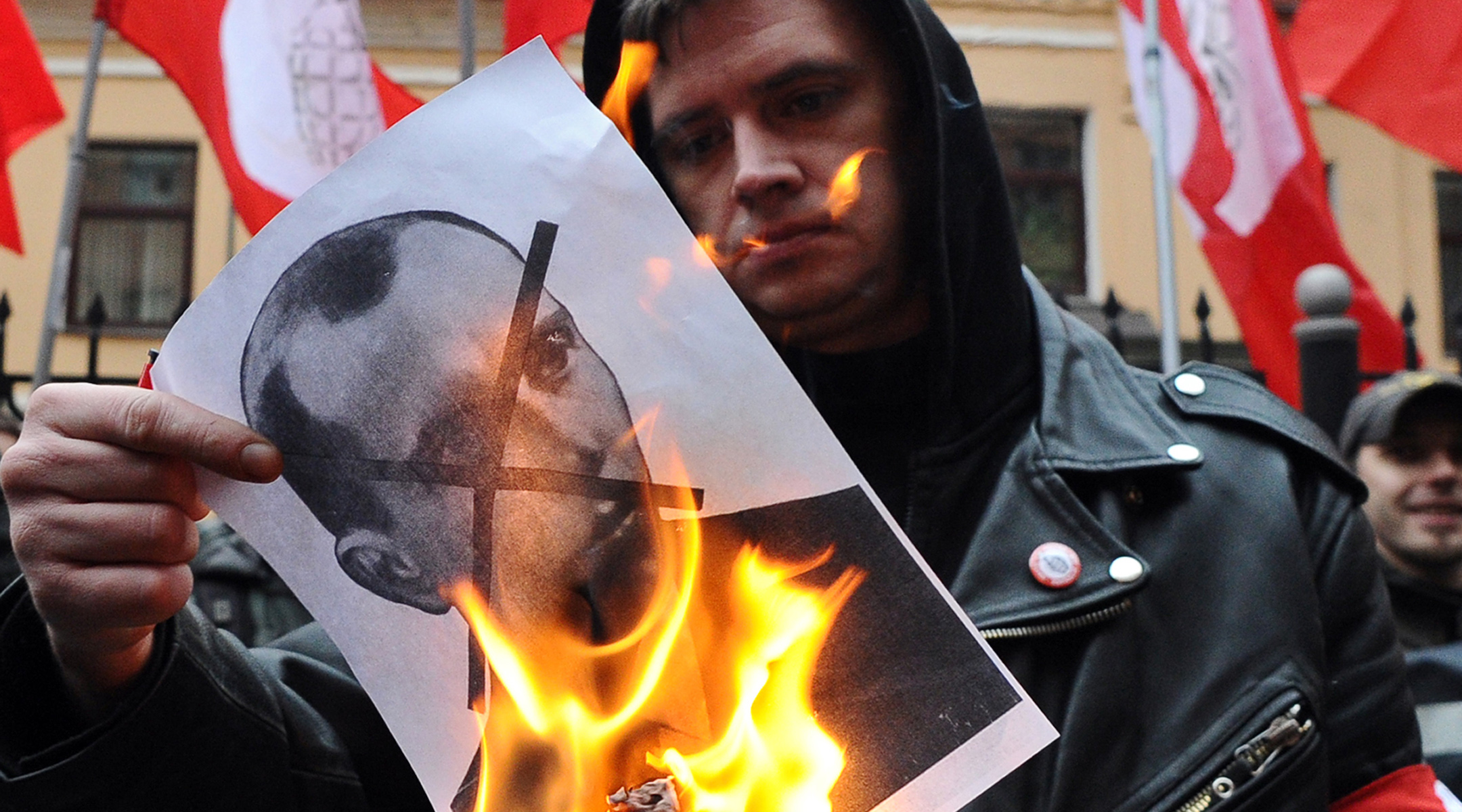(JTA) — The rabbi appears serious, with just the barest hint of a smile behind his long white beard. Standing beside him, a stocky, unremarkable man with a thick black mustache grips a smartphone, his arms held straight at his sides. He also has a subtle smile.
The scene is both pedestrian — and remarkable. Tweeted from the sidelines of the Ukrainian Jewish Forum, a gathering of representatives of the post-Soviet state’s Jewish organizations, the photo shows Yaakov Dov Bleich, chief rabbi of Kiev and Ukraine, with Stepan “Steve” Bandera, the eponymous grandson of one of Ukraine’s most notorious Nazi collaborators.
“Met up with my good friends … for breakfast,” Bleich tweeted, tagging Bandera as well as Ukrainian Health Minister Ulana Suprun and her husband, Marko.
During World War II, the older Bandera had served as Providnyk — a title analogous to the German Fuehrer — of the Organization of Ukrainian Nationalists, a brutally violent and authoritarian Ukrainian ultranationalist organization that had collaborated with the Nazis.
Formed from a merger of fascist and far-right groups, the OUN, as it is known colloquially, had engaged in a sustained campaign of terror and political assassination during the interwar period, when western Ukraine was under Polish control. By 1940, the organization split and the elder Bandera took over the larger faction, OUN-B, which subsequently adopted a 1941 manifesto calling on its members to “liquidate undesirable Poles, Muscovites, and Jews.”
The OUN collaborated with the Nazis and its members served in various German formations taking part in the Holocaust, but eventually turned against the Nazis when Berlin refused to recognize its declaration of Ukrainian independence. Bandera was incarcerated in the Sachsenhausen concentration camp (two of his brothers would die in Auschwitz) — he was later released and resumed his collaboration.

Steve Bandera, right, with Yaakov Dov Bleich, one of Ukraine’s chief rabbis, to his left. (Courtesy of Bandera)
Among Holocaust historians, the consensus is that the OUN and its military offshoot, known as the UPA, were responsible for the deaths of thousands of Jews and up to 100,000 Poles during the war (estimates vary).
In 2019, however, with the rise of nationalism and anti-Russian sentiment in Ukraine, Bandera is being rehabilitated in the country as a patriotic, anti-Soviet hero. And his grandson is at the center of the debate over his legacy, reaching out to Jews and expressing sadness over the Holocaust while defending his grandfather’s reputation and feuding with historians who insist Stepan Bandera has Jewish blood on his hands.
Steve Bandera, a journalist and Canadian citizen, has steadfastly maintained for years that his grandfather, and the Ukrainian nationalist movement in general, are innocent of perpetrating war crimes against Jews. It’s a viewpoint that some historians see as Holocaust revisionism.
Bandera said he was unable to tell from firsthand experience what his grandfather thought about Jews. However, he told the Jewish Telegraphic Agency, in “the anti-Soviet activism of my dad there were a lot of Jewish colleagues and allies” and his father “made an effort of reaching out and working together with Jews that were on the same page.”
Bandera insists that anti-Ukrainian propaganda by the Russians has distorted the historical record.
“The Bandera moniker became a symbol and was used very much in Soviet propaganda to demonize” Ukraine, he said in a video interview from that country. “Bandera even sounds like bandit. It sounds bad, right? And so I came to see how the Soviet propaganda used it and that became part of the popularization, if you will, of bringing it into the discourse. Putin and Russia still use it today as a way, as a moniker, as a term of denigration.”
Over the years, Bandera has had numerous run-ins with historians of Ukrainian nationalism and the Holocaust, repeatedly asserting that his grandfather had been “cleared” of all wrongdoing and that those writing about the issue were (as he wrote in a 2010 letter to the Edmonton Journal) attempting “to smear our family name.”
Per Anders Rudling, a Swedish researcher who has written extensively on narrative formation in the Ukrainian diaspora, has accused Steve Bandera of revealing “the mindset of fascist apologists.”
Bandera refers to Rudling as a “hack pursuing a political agenda under the guise of Holocaust studies.”
The cult of Bandera
Stepan Bandera was murdered by the KBG while living in exile in Munich in the 1950s, and his widow moved to Canada, where there is a large Ukrainian diaspora community. She arrived with her three young children, including Steve’s father, Andrii. Born in Winnipeg in 1970, Steve Bandera grew up in a Ukrainian nationalist milieu in Toronto, attending a Ukrainian school, participating in Ukrainian youth groups and accompanying his father (a political activist and the editor of The Ukrainian Echo, a leading Banderite publication) to anti-Soviet demonstrations.
His father died in his early 40s, leaving Steve the bearer of the Bandera name. When Ukraine declared its independence from the Soviet Union in 1991, he immediately flew to Kyiv, or Kiev in the conventional English spelling. Voters had to ratify the independence declaration in a referendum and he was determined to do his part for “the fight and the struggle.”
“We actually brought over three offset printing presses from Canada and we set up a printing press in a factory on the outskirts of Kyiv,” he said. “We started pumping out leaflets and materials that the message was to vote for Ukrainian independence.”
He would continue to travel there, developing a career in journalism on both sides of the Atlantic, including stints at the Kyiv Post and a variety of North American diaspora outlets.
https://twitter.com/sbandera/status/1121176372389523456
In 2014, Russia invaded Ukraine, annexing the Crimean peninsula and launching a proxy war in the country’s industrial east. In response, Kiev launched a new campaign to sever its historical bonds with its neighbor, creating a new national historiography that lauded and rehabilitated “anti-Soviet” figures such as Bandera’s grandfather.
The younger Bandera has traveled Ukraine teaching about his family history, and on several occasions attended the dedication of statues of his grandfather. To a certain degree, he said, such glorification makes him uncomfortable.
“For me personally, the monuments and that business smacks of Sovietness, but that’s coming from a Canadian background,” he said. “I really believe that if in Ukraine and in the West, if there was as strong a condemnation of Lenin and Stalin as there is of Hitler, then the demand for the Bandera monuments would fall dramatically. The whole monument thing would cease to be an issue.”
Such monuments, in his view, constitute an attempt by Ukrainians to say “hey, we have our history, this is who we think are our heroes.” It is also, he said, a way of saying “Bandera’s not only about that manifesto from 1941, there is a lot to that history and we have our own history as well.”
Asked about the present-day Ukrainian Jewish community, which has come out strongly against his grandfather’s rehabilitation, Bandera called for dialogue and blamed his family name’s bad reputation on “propaganda.”
“If I get into polemics, we get into the what-about side of things, then I can talk about Menachem Begin or I can talk about Irgun or I can talk about Stern,” he said, referring to Jewish militant figures and groups that fought an underground war against the British in Mandatory Palestine.
Despite his spirited defense of his grandfather’s legacy, however, Bandera stressed that “the only real thing I can do or we can today is to make a pledge that this shouldn’t happen again and it cannot happen again.”
“Insofar as Bandera remains a symbol to this day,” he said, “I think it’s also important to stand up and be seen with the Jewish community to say, hey, we can stand together.”
Openness and blind spots
Steve Bandera’s contradictions divide observers and historians.
According to Mark Freiman, a Canadian lawyer and board member of the Ukrainian Jewish Encounter, an organization that seeks to create common ground between Ukrainians and Jews, Bandera has “a blind spot.”
Growing up in Canada, he holds many liberal North American values and “has a benign view of Jews and Judaism,” Freiman said.
He accompanied Bandera to the Ukrainian village of Sambir a decade ago. The village had been the site of a massacre during the Holocaust, but instead of erecting a memorial to the murdered Jews, local residents put up three 15-foot crosses on the site. The two hoped to reach a compromise that would honor the Jews’ memories.

A statue of Stepan Bandera stands in Ternopil, Ukraine. (Mykola Vasylechko/Wikimedia Commons)
While Bandera’s efforts were rebuffed, “he was greeted everywhere as a living god,” Freiman recalled.
“He has always been a pleasant fellow and well disposed to our project, but I don’t think he’s re-evaluated his grandfather or his grandfather’s views of Jews,” Freiman said, describing what he believes to be a “whole class of Ukrainian nationalist intellectuals” who are trying to “set aside racist concepts and overcome any traditional anti-Semitism” but are not yet ready to let go of a “nationalist past they’ve inherited.”
“Given who he is and where he came from, I was very impressed by his openness and warmth and his attempt to be helpful, which was genuine and sincere,” he said.
Bleich, who met Steve Bandera two decades ago during the early post-Soviet period, also had positive things to say.
While he described Bandera as an acquaintances rather than a close friend, the Brooklyn-born rabbi said that he immediately formed a bond with him.
“I found him to be open and, so to speak, respectful of the same things that I am. Living in Ukraine as a U.S. expat, when you meet English-speaking people you start to identify with them before you learn who they are,” Bleich said. “I find him to be an objective guy as a journalist and a Western-oriented guy. it happens to be he has the pedigree he has.”
Asked whether he believed that Steve Bandera was a Holocaust revisionist, the rabbi said that the two never discussed the issue and that he believed “eventually there will be an objective history written by historians and not a political history.”
“I’m not a historian,” Bleich asserted. “You have to get a historian who knows exactly what his grandfather did do and know what he’s trying to do, and then you can describe him as a Holocaust revisionist or not.”
This did not sit well with Rudling, the Swedish researcher.
“I don’t think history is like the Jewish side or the Ukrainian side. I’m a historian,” he told JTA. “Bandera’s legacy? I think it’s pretty well documented what Bandera thought about the Jews.”
Grzegorz Rossoliński-Liebe, a historian of a massive political biography of Stepan Bandera, also is critical of his grandson, saying he “was involved in the propagation of the cult of his grandfather” in the 1990s and 2000s.
“He participated in numerous ceremonies devoted to the glory of Bandera, such as unveiling of monuments and receiving awards from President Viktor Yushchenko. He attacked scholars who investigated the OUN and UPA and expressed many neo-fascist and anti-Semitic ideas in nationalist Ukrainian and diaspora newspapers,” Rossoliński-Liebe told JTA.
“In my opinion, it is a mixture of emotional attachment to his grandfather, the climate of the diaspora environment and his nationalist views that motivated him to propagate the Bandera cult in post-Soviet Ukraine.”
For his part, Bandera said that Rossoliński-Liebe’s book contains “scandalous claims” and complained that the German-Polish scholar never consulted with him while researching the work.
Among other Jews in Ukraine, not everybody is as ready as Bleich to embrace Bandera’s grandson.
Inna Ioffe, the CEO of the Jewish Confederation of Ukraine, with which the chief rabbi is affiliated, told JTA in no uncertain terms that her organizations have “no ties with [Steve] Bandera.” She insisted that his presence at the Jewish Forum had nothing to do with the umbrella group and he was there only in the capacity of a personal guest of the rabbi.
And while Ioffe said that Bandera was not responsible for his grandfather’s crimes and she did not object to his relationship with Bleich, she made it clear repeatedly that there were “no contacts between Stepan Bandera’s grandson and the Jewish Confederation of Ukraine.”
Dialogue and reconciliation
While the legacy of the Second World War has been a bone of contention between Jews and Ukrainians, Bandera believes that the Russian-Ukraine conflict may hold the key to reconciliation between the two groups.
“It’s not a total war like it was in World War II, but you see Ukrainians and Jews and other groups fighting an authoritarianism coming from the north in the person of Putin,” he said. “So in that sense it’s easier to find common ground and commit to being allies [because] there’s a common enemy now.”
Bandera also held up the recent success of Jewish politicians in Ukraine like Prime Minister Volodymyr Groysman and President Volodymyr Zelensky, saying that they are a convincing proof against “this notion that Ukrainians are somehow genetically anti-Semitic.”
(Bandera himself has been critical of Zelensky, a comedian turned politician, recently writing on Facebook that opposition to Zelensky stemmed from what Bandera described as his “anti-Ukrainian cultural offerings.”)
“The president and the prime minister aside, there’s also a tremendous amount of wealth in Ukraine concentrated in Jewish hands, the oligarchs,” he continued. “You have Pinchuk, Kolomoisky [and] Bogolyubov,” referring to the Ukrainian billionaires Viktor Pinchuk, Igor Kolomoisky and Gennadiy Bogolyubov.
“If Ukrainians are so anti-Semitic, what about these guys? Nobody’s going around taking them out or forcing them out of the country. Jewish-Ukrainian relations are so important for making Ukraine a success, so I think it’s a good thing.”
Bandera believes that he has “grappled” and “resolved” how he sees the racial component of his grandfather’s legacy.
Anti-Semitism, he explained, “was unfortunately a part of the political discourse at the time. That doesn’t justify any crimes. Any and all crimes against innocent civilians need to be researched, punished to the extent that they can still be punishable and a pledge has to be made that, y’know, never again.”
JTA has documented Jewish history in real-time for over a century. Keep our journalism strong by joining us in supporting independent, award-winning reporting.






